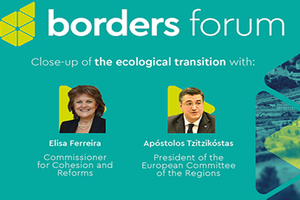News
The ecological transition – an issue for border areas at the heart of the upcoming Borders Forum
April 2022
Elisa Ferreira, the Commissioner for Cohesion and Reforms, and Apostolos Tzitzikostas, President of the European Committee of the Regions, have their say about a major issue for cross-border areas, but not only: the ecological transition.
The event is taking place on 21-22 June in Paris. It is being organised by the MOT with the support of the European Commission, the European Committee of the Regions, the National Agency for Territorial Cohesion (ANCT) and the European research programme ESPON. Register now as places are limited!
Click here for programme and registration.
What do cross-border territories represent for you?
Elisa Ferreira: One in three of our European citizens lives in a cross-border region. This is very significant. The European Commission has been taking a particular interest in these territories for many years now. Border regions are places where the European integration project is highly visible. The benefits of the single market and the freedoms of movement are there for all to see. However, this is also where we can observe shortcomings or gaps – some activities such as studying, working, receiving health care can still be too complex and sometimes even more costly in border regions, especially when they are rural and suffer from demographic decline. As Commissioner for regional policy, I am keen to ensure that border regions are not left behind when it comes to socio-economic development and the twin transition Europe is currently undergoing.
Apostolos Tzitzikostas: Cross-border regions are the places where the European Union is most visible, in both the positive and the negative sense. In recent decades, after centuries of hard borders, we have seen borders disappear, but not always entirely. For the past two years with the pandemic, and now with the war in Ukraine, borders are resurfacing. We still see a number of unnecessary legal and administrative barriers. The day when citizens and businesses from border regions no longer feel the effects of borders in their daily lives will be the day we can say that we have truly created a United Europe.
How can cross-border territories be levers for the European Green Deal?
Elisa Ferreira: In July 2021, the European Commission issued a report on border regions, calling them “living labs of European integration”. In that report, we highlight the key role border regions can play in implementing the European Green Deal. There are many Green Deal priorities that require action across borders. For instance when restoring biodiversity, we must ensure that there are enough ecological corridors for wild life to freely move around our continent. Risk prevention and management needs to be looked at in a cross-border context too: neither floods nor fire will stop at national borders. Border regions can also play an important role in renewable energy production, if we let them access local and regional electricity grids across borders and foster stronger citizen energy communities. All of these actions can and should be supported by our Interreg cross-border cooperation programmes, which are being adopted this year.
Apostolos Tzitzikostas: The Green Deal requires tackling the climate and eco crisis systematically. Only with a transformative approach to managing and living in our local areas can we ensure an effective green transition and synergies with the digital transition. Much of the Green Deal requires actions that cross borders, e.g. ensuring that natural ecosystems thrive and support climate change. These regions can be test-beds for a local approach to the Green transition and can thus boost cross-border cooperation.
What do you expect from the Borders Forum 2022?
Elisa Ferreira: In 2020, the Borders Forum took place whilst we were still very affected by the COVID-19 pandemic and the particularly serious consequences it had for border populations. This year, the Borders Forum takes place in an even heavier context, with the consequences of war on the European Union’s doorstep, something that none of us could have imagined.
I would like the Borders Forum to be the place where we can exchange views on our core European values and reiterate how committed we all are to live in peace, in a Union of democracy and solidarity, across all borders. United in diversity is our motto. Let us remind ourselves of how powerful those words are in cross-border cooperation.
Apostolos Tzitzikostas: In 2020, despite the difficult situation, the Borders Forum set new standards for events on cross-border cooperation. This year's programme looks even more interesting and highly relevant, as we finalise our recommendations for the Future of Europe, which must include improvements in cross-border cooperation and in the overall quality of life in border regions. I expect fruitful discussions and a showcase of what border regions can bring to the EU's development in different policy areas.

